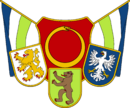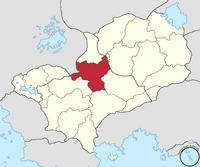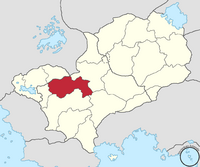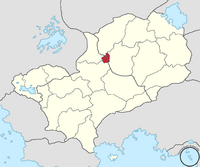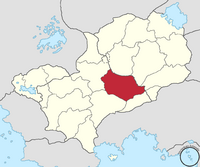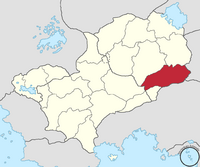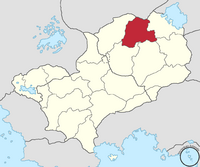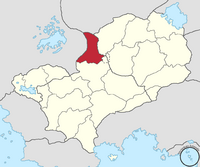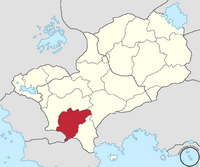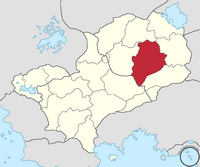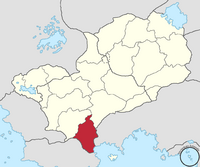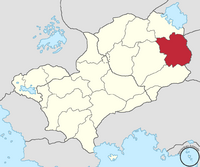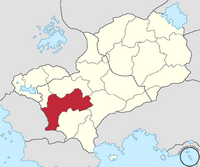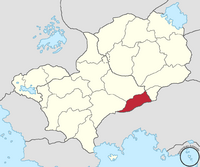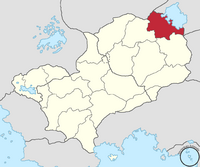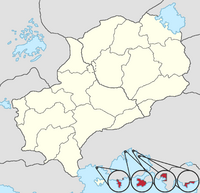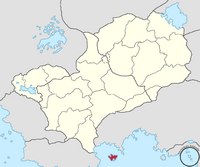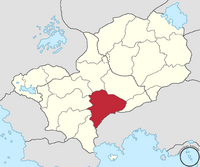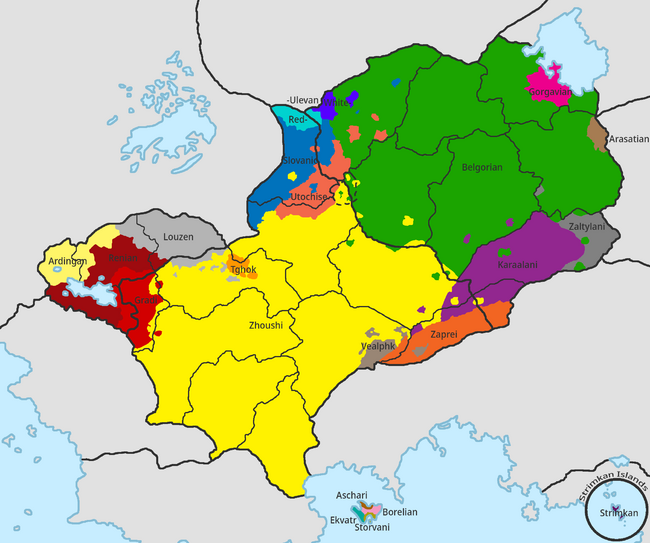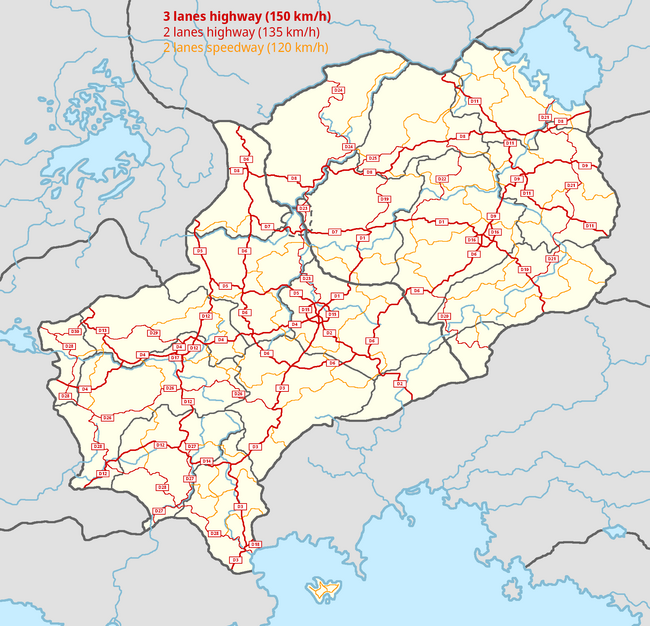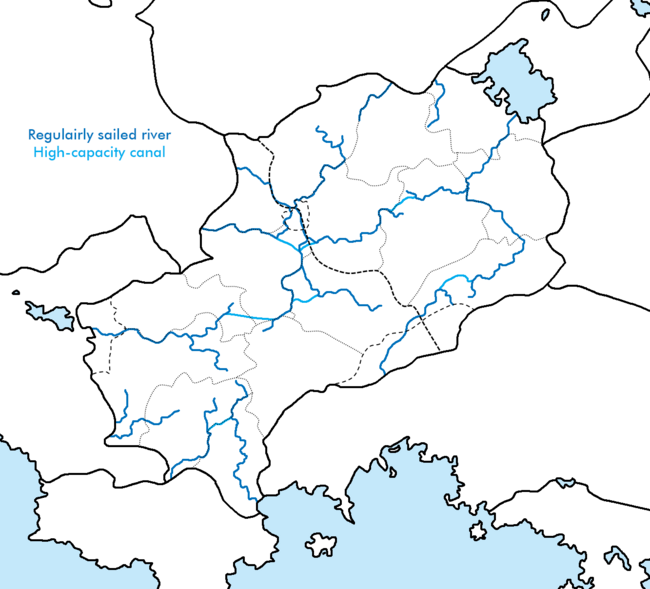Mustelaria
This article is incomplete because it is pending further input from participants, or it is a work-in-progress by one author. Please comment on this article's talk page to share your input, comments and questions. Note: To contribute to this article, you may need to seek help from the author(s) of this page. |
Mustelaria is a federation in Anteria consisting of two countries: Monte Blanco & Zhousheng. It was formed as a democratisation of the Empire of Three kings on August 23rd, 2020. Mustelaria is a proud member of the Sekidean Union's Inner Circle and a important actor in Anterian World Assembly. It borders Prei Meas to the south, Speke to the southwest, Gadorien to the west, Qazhshava to the northwest, Bakyern to the north, Assumptaria to the northwest and Gabrielland to the east.
Federation of Mustelaria Federace Mustelarijє (Zhoushi) Ⲙⲟⲥⲧⲉⲗⲁⲣⲓⲁ Ⲫⲉⲇⲉⲣⲁⲧⲓⲁ (Belgorian)
| |||||||||||||||||||||||||||||
|---|---|---|---|---|---|---|---|---|---|---|---|---|---|---|---|---|---|---|---|---|---|---|---|---|---|---|---|---|---|
| Anthem: Hey, Slavs! Zhoushi: Hej, Slovany! Belgorian: ϩⲉⲓ ⲥⲗⲟⲯⲁⲛⲉ! | |||||||||||||||||||||||||||||
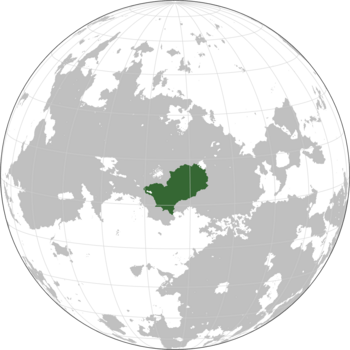 | |||||||||||||||||||||||||||||
| Capital | Dumtapolis | ||||||||||||||||||||||||||||
| Largest city | Plavlino | ||||||||||||||||||||||||||||
| Official languages | Neo-Mustelarian, Polyashi Sign Language, Zhoushi, Belgorian | ||||||||||||||||||||||||||||
| Working languages | Zhoushi, Belgorian, Karaalani, Slovanic, Velpan, Gradi, Storvani, Zaprei, Aschari, Gorgavian, Louzen | ||||||||||||||||||||||||||||
| Ethnic groups | Zhoushi, Belgorian, Karaalani, Slovanic, Ulevan, Velpan, Gradi, Storvani, Zaprei, Aschari, Gorgavian, Louzen, Arasatian | ||||||||||||||||||||||||||||
| Demonym(s) | Mustelarian Mustelarish | ||||||||||||||||||||||||||||
| Government | Federal Constitutional Republic | ||||||||||||||||||||||||||||
• Federal Chairman | Serjoža Serevětev[b] | ||||||||||||||||||||||||||||
• Prime Minister | Jeliþo Pogөf[c] | ||||||||||||||||||||||||||||
| Legislature | Federal Parliament of Mustelaria Federal Senate of Mustelaria | ||||||||||||||||||||||||||||
| History of Mustelarian unity | |||||||||||||||||||||||||||||
• Bogmian Empire wars | 760 CE - 880 CE | ||||||||||||||||||||||||||||
| 1773 CE - November 18th 1862 | |||||||||||||||||||||||||||||
• Monte Blancan state | December 2nd 1862 | ||||||||||||||||||||||||||||
| February 4th 1912 - May 8th 1925 | |||||||||||||||||||||||||||||
• Zhoushi Federation declared | September 6th 1943 | ||||||||||||||||||||||||||||
| August 23rd 2017 | |||||||||||||||||||||||||||||
• Water (%) | 5 | ||||||||||||||||||||||||||||
| Population | |||||||||||||||||||||||||||||
• 2020 estimate | 241,571,000 | ||||||||||||||||||||||||||||
• Last[d] census | 253,932,000 | ||||||||||||||||||||||||||||
• Density | 98.557/km2 (255.3/sq mi) | ||||||||||||||||||||||||||||
| GDP (PPP) | 2018 estimate | ||||||||||||||||||||||||||||
• Total | 10,3 Trillion AWU (8,3 Trillion SEK) | ||||||||||||||||||||||||||||
• Per capita | 36,276 AWU (29,021 SEK) | ||||||||||||||||||||||||||||
| GDP (nominal) | 2019 estimate | ||||||||||||||||||||||||||||
• Total | 9,5 Trillion ACU (7,6 Trillion SEK) | ||||||||||||||||||||||||||||
• Per capita | 33,458 ACU (26,766 SEK) | ||||||||||||||||||||||||||||
| HDI (2019) | very high | ||||||||||||||||||||||||||||
| Currency | Sekinar (SEK) | ||||||||||||||||||||||||||||
| Time zone | UTC-4; -5 (PMT; PST) | ||||||||||||||||||||||||||||
• Summer (DST) | UTC-4, -5 (not observed) | ||||||||||||||||||||||||||||
| Driving side | right | ||||||||||||||||||||||||||||
| Calling code | +720 / +723[e] | ||||||||||||||||||||||||||||
| Internet TLD | .zs / .mb[f] | ||||||||||||||||||||||||||||
| |||||||||||||||||||||||||||||
The Empire of Three Kings
Coup in Belgoria
In 1769, a new dynasty in Belgoria took power, named the "Chepichkik" (Zhoushi: Чepiчkik, Belgorian: ⲧϣⲉⲡⲓⲧϣⲕⲓⲕ) dynasty, quickly establishing itself as the new wind to the stagnating Belgorian Kingdom (the former Diren dynasty still maintained the claim on the throne, although being exiled to the Duchy of Karaalania). Under their rule, Belgoria opened to the world, officially renaming itself to Monte Blanco to reflect the name of the country to the outside world.
In 1770, Monte Blancan armies entered Karaalanian Duchy, quickly capturing the capital and deffinitevely taking over the area to be integrated into Monte Blanco. The deposed king, Jakob III. of house Diren, was brought back, but his life was spared and he was granted a rule over Gorgavian March (border territory of the Monte Blancan monarchy)
The Empire is proclaimed
| Anthem: Emperor be protected | |
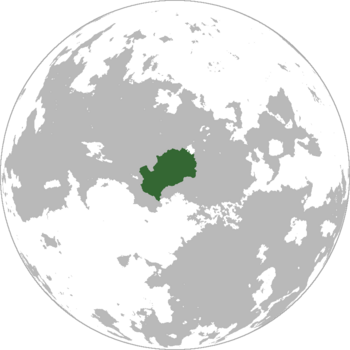 | |
| Capital | Klimdan |
| Largest city | Nadgorica |
| Official languages | Traditional Mustelarian (imperial) Belgorian, Bogmian, Zhengian (regional) |
| Ethnic groups | Zheng, Bogmian, Belgorian, Karaalani, Slovanic, Ulevan, Velpan, Zaprei, Aschari, Gorgavian, Haldeni, Arasatian |
| Demonym(s) | Mustelarian Imperial |
| Government | Empire |
• Emperor | Lagislaw I. Chepichkik (first)
|
| Legislature | The Imperial Court House of Lords |
| Population | |
• 1820 estimate | 98,000,000 |
| Currency | Imperial Wode |
In 1772, Kingdom of Belgoria entered into the war with the Kingdom of Bogmia and Kingdom of Zhengia, quickly overrunning the two countries and forcing their royal lineages to agree to create an Empire under Chepichkik rule. The first king of the Empire, Lagislaw Chepichkik I. (Zhoushi: Laџislaƿ Чepiчkik I., Belgorian: ⲗⲁⲇϭⲓⲥⲗⲁⲱ ⲧϣⲉⲡⲓⲧϣⲕⲓⲕ ⲓ.), abdicated from the post of the Belgorian king and officially appointed the deposed ruler Jakob III.
That created the most easily recognizable name, the "Empire of Three Kings", as it was the Empire, where three kings rulled thirds of the Empire (House of Leto in Bogmia, House of Jamgic in Zhengia and House of Diren in Monte Blanco), being supervised by an Emperor (House of Chepichkik). However officially, the name of the empire was "The Polyash Empire", are at the time referred as the "Imperivm Pœliaticvm" in Linguic.
Westwards expansion
After the establishment, the Empire quickly created a unified imperial elite units and established a military border zone approximately in the areas of present day Mustelarian-Bak border. In January 1776, Imperial messengers were sent to ask Kingdom of Haldenia to join the new Empire and create the "Empire of Four Kings", however, the Haldenian Queen Judita IV. of House Khani refused the request. At the end of the year, Imperial troops crossed the mountain range and quickly advanced to the west and to the then capital of Haldenia in Orlobirg.
After a set of battles won by the elite units and despite high casualties on both sides, Kingdom of Haldenia officially laid down their arms on June 1779. The Queen was imprisoned and the royal lineage has probably disappeared as there is no further historical record of the House Khani.
After the defeat, the Kingdom was officially integrated as a Duchy into the Kingdom of Bogmia. Later, the Duchy was declared an Archduchy.
Reaching the coast
With the attempt to gain an access to coast, Imperial troops slowly pushed through territory fractured by war into tens of small ducies, fiefdoms, electorates and marches until reaching the sea in the approximate area of present-day Mosterec, where the imperial troops proclaimed another subdivision, named the "New Bogmian March", that was ceded to the Kingdom of Bogmia with areas bordering Zhengia being ceded to the Kingdom of Zhengia.
Political reforms
Sometimes between 1823 and 1825, the Empire has constitutionalized under the reign of the Emperor Jakob Chepichkik I., which for example gave universal suffrage to all males in the Empire, officially banned corveé and created an obligatory 8 year education system for children, which gave more power to the peasants and shifted the center of power towards peasants, which caused many uproar in the upper echelons of the feudal system and caused a brief mutiny, which was quickly suppressed.
Breakup of the country
Beginning in 1860, the massive wave of popular uproar from the lower populace caused the kings to limit their power more and more, which destabilized the feudal link between the kings and emperor, as neither side could control the sustainability of the system anymore. In June 1861, Bogmian king abdicated completely, gravely wounding the feudal stability. Desperate reforms followed to hook the coexistence of the three states to the popular will and not a feudal link, but with the abdication with Zhengian king in March 1862, it was clear, that the Empire was going to fade.
First to declare the independence was the State of Bogmia, which declared the tie to the Empire invalid on December 1st 1862. The king of Monte Blanco, seeing the abdication of the other two kings, has decided to secede one day later, on December 2nd. The Empire technically ceased to exist on November 18th, when the Emperor Lagislaw Chepichkik III. decided to abdicate in favor of one of his children, but Zhengia officially continued to operate as the last Imperial state until January 1863.
Neo-Mustelarian
Neo-Mustelarian is a zonal constructed language serving as a simplistic linguistic bridge between Zhoushi, Belgorian, Karaalani, Louzen, Slovanic, Ulevan, Storvani and Velpan.
It is heavily simplified, elinimating grammatical cases (just like in Velpan).
| A a | Â â | B b | C c | Č č | D d | E e | È è | Ë ë | А а | Б б | В в | Г г | Д д | Е е | Ё ё | Ж ж | З з | Ⲁ ⲁ | Ⲃ ⲃ | Ⲅ ⲅ | Ⲇ ⲇ | Ⲉ ⲉ | Ⲋ ⲋ | Ⲍ ⲍ | Ⲏ ⲏ | Ⲓ ⲓ |
| F f | G g | Ǧ ǧ | H h | Ȟ ȟ | I i | J j | K k | L l | И и | Й й | К к | Л л | М м | Н н | О о | П п | Р р | Ⲑ ⲑ | Ⲕ ⲕ | Ⲗ ⲗ | Ⲙ ⲙ | Ⲛ ⲛ | Ⲝ ⲝ | Ⲟ ⲟ | Ⲡ ⲡ | Ⲣ ⲣ |
| M m | N n | O o | P p | Q q | R r | S s | Š š | Ŝ ŝ | С с | Т т | У у | Ф ф | Х х | Ц ц | Ч ч | Џ џ | Ш ш | Ⲥ ⲥ | Ⲧ ⲧ | Ⲩ ⲩ | Ⲫ ⲫ | Ⲭ ⲭ | Ⲯ ⲯ | Ⲱ ⲱ | Ϣ ϣ | Ϥ ϥ |
| T t | U u | Û û | V v | W w | X x | Y y | Z z | Ž ž | Щ щ | Ъ ъ | Ы ы | Ь ь | Э э | Ю ю | Я я | Ϧ ϧ | Ⳉ ⳉ | Ϩ ϩ | Ϫ ϫ | Ϭ ϭ | Ϯ ϯ | Ⳁ ⳁ | ||||
| Number | 1 | 2 | 3 | 4 | 5 | 6 | 7 | 8 | 9 | 10 | 11 | 12 | 13 | 14 | 15 | 16 | 17 | 18 | 19 | 20 | 21 | 22 | 23 | 24 | 25 | 26 | 27 | 28 | 29 | 30 | 31 | 32 | |
|---|---|---|---|---|---|---|---|---|---|---|---|---|---|---|---|---|---|---|---|---|---|---|---|---|---|---|---|---|---|---|---|---|---|
| Latin | Complex | A | B | C | Č | D | E | È | F | G | Ǧ | H | Ȟ | I | J | K | L | M | N | O | P | R | S | Š | Ŝ | T | U | V | Z | Ž | Â | Ë | Û |
| Simple | A | B | C | Cx | D | E | F | G | Gx | H | Hx | I | J | K | L | M | N | O | P | R | S | Sx | W | T | U | V | Z | Zx | Ja | Jo | Ju | ||
| Govoric | А | Б | Ц | Ч | Д | Е | Э | Ф | Г | Џ | Х | И | Й | К | Л | М | Н | О | П | Р | С | Ш | Щ | Т | У | В | З | Ж | Я | Ё | Ю | ||
| Protopolyash | Ⲁ | Ⲃ | Ϯ | Ϫ | Ⲇ | Ⲉ | Ⲫ | Ⲅ | Ϥ | Ϩ | Ⲭ | Ⲓ | Ⲏ | Ⲕ | Ⲗ | Ⲙ | Ⲛ | Ⲟ | Ⲡ | Ⲣ | Ⲥ | Ϣ | Ⲋ | Ⲧ | Ⲩ | Ⲃ | Ⲍ | Ϭ | Ⲓⲁ | Ⲓⲟ | Ⲓⲩ | ||
| IPA | a | b | t͡s | t͡ʃ | d | ʲɛ | ɛ | f | g | d͡ʒ | h | x | i | j | k | l | m | n | ɔ | p | r | s | ʃ | ʃt͡ʃ | t | u | v | z | ʒ | j͡a | j͡ɔ | j͡u | |
Federal Institutions
Mustelarian federal organs have rights over:
| Name of the organ | Federal Chairman | Field of subject | Note to the functionality |
|---|---|---|---|
| Federal Council for Finance management | Ⲟⲗⲉⲅⲁ Ⲙⲁⲗⲁ (Olega Malā) |
Council is supposed to supervise Zhoushi and Monte Blancan governmental spendings, foreign trade deals and Sekinar monetary policy | Organ is not supervised to control or set budgets or supervise tax collection, only coordinate spending policies of the federal subjects |
| Federal Council for Education and Research | Шimon Boglar | Council is supposed to supervise Zhoushi and Monte Blancan ministries for education | Organ is dedicated to control lenght, setting, rules and regulations of school education and support federal competitions and boarding schools |
| Federal Council for Enviromental protection and development | Ⲅⲣⲓⲅⲟⲣ Ⲧⲣⲁⲩⲧⲉⲛⲃⲉⲣⲅ (Grigor Trautenberg) |
Council is supposed to supervise if Zhousheng and Monte Blanco are following enviromental protection laws and control | Public transport in the Federal Capital is directly supervised by this organisation |
| Federal Council for National protection | Ⲍⲓⲗϥⲁⲣ Ϣⲉⲃⲉⲕ (Zilvar Šebek) |
Council is supposed to supervise Zhoushi and Monte Blancan protection of national minorities both in and out of 3 recognized autonomies | Council also controls protections of Monte Blancans in Zhousheng and vice versa |
| Federal Council for Federal land administration | Pitr Poglasov | Council is supposed to directly control and maintain MUFETA bases and Federal Capital | This council is not elected only by bodies of federal parliaments, but also by populace of federal capital |
| Federal Council for Crisis management | Fraƞчiшek Livinov | Council is supposed in maintaining the matterial reserves and has direct power over MUDAMI in the peacetime | This organ is considered to be the most controversial part of the federal management |
| Federal Council for Justice | Ⲓⲛⲅⲣⲓⲇ Ⲃⲁⲗⲁⲕⲟϥⲁ (Ingrid Balākovā) |
Council is supposed to supervise Zhoushi and Monte Blancan law enforcement | This council is responsible for controlling the compatibility of the two legal codes and has a charter and laws over them |
| High Court of Mustelaria | Ⲕⲓⲣⲓⲗ Ⲥⲩⲭⲁⲛⲉⲕ (Kiryl Suchānek) |
The highest instance of justice in Mustelaria, subservient only to the Supreme Court of the Sekidean Union | Serves as the last instance of appeal for important cases inside of Mustelaria |
| Mustelarian military command | Arnold Чorny | Highest command structure having direct power over MUFETA and indirect power over MUZHRA (Zhoushi army) and MUMBRA (Monte Blancan army) | Has the last say in military issues and is responsible to Sekidean Union military HQ in Pōr Ōntōra |
Subdivisions
Overview
Mustelaria is a federation of two countries: Monte Blanco and Zhousheng. A total of 4 autonomies exist. Grad Autonomy, Zaprei Autonomy, Storvan Autonomy and Autonomy of Phnom Montes. Autonomy of Phnom Montes and Zaprei Autonomy are de facto unified under one autonomous government and have one representative seat in Sekidean Council.
List of regions
|
Ethnicities
Mustelaria officially recognizes 13 nationalities as a "national nationalities", which are officially not a minority, but are recognized as a nationalities, which have somewhere in Mustelaria an area, where they are a majority or plurality.[1] Those nationalities are defined as "...being either more than 15 million people spread across Mustelaria or being more than half a million inhabitants localized in a certain area, where they have to be a plurality...", however, nationalities are "...defined by people themselves and are not associated to a language, but the a internal feeling of each individual...", so the national identity is tied to a feeling rather than to a cultural or linguistic base, although people are encouraged by official documents to consider the language they speak.
| Ethnic distribution of Mustelaria | |||
|---|---|---|---|
| Graph of the distribution: | |||
| Color | Nationality | Language family | Population (in Mustelaria) |
| Zhoushi (Bogmian, Zhengian) | Slavic | 121 Million | |
| Belgorian | 108 Million | ||
| Slovanic | 19 Million | ||
| Karaalani | 18 Million | ||
| Gorgavian | 4 Million | ||
| Louzen (Haldenian) | 2 Million | ||
| Arasatian | 1 Million | ||
| Velpan | 1 Million | ||
| Ulevan | 1 Million | ||
| Storvani | 0.5 Million | ||
| Zaprei | Prei-Phnom | 9 Million[2]
| |
| Preimeai | |||
| Phná | |||
| Aschari | 0.7 Million | ||
| Gradi | Germanic | 6 Million | |
| Borelian | Bornese | 0.6 Million | |
| Tghok | Mokhaic | 0.5 Million | |
| Neuew, Agarn | Sivuk | 0.5 Million | |
Transport net
Highways
| Highway net of Mustelaria | ||||
|---|---|---|---|---|
| Sign | Number of lanes | Important connections | First part opened | Construction finished |
| D-1 | 4 Lanes | Kandan, D-7, Stolonov, Montginia | January 1963 | March 1978 |
| D-2 | 4 Lanes | Kandan, Preimand, Preimeai border | January 1963 | March 1999 |
| D-3 | 3 Lanes | Kandan, Ukadsk, Mosterec, Scouse border | February 1965 | November 1971 |
| D-4 | 3 Lanes | Kandan, Orlobirg, Gadori border | May 1964 | December 1970 |
| D-5 | 3 Lanes | Kandan, Plavlino, Qash border | January 1965 | September 1973 |
| D-6 | 3 Lanes | D-1, Ukadsk, Plavlino, Lonking, Bak border | January 1969 | March 1975 |
| D-7 | 3 Lanes | D-6, Dumtapolis, Stolonov, D-1 | May 1969 | April 1976 |
| D-8 | 3 Lanes | Qash border, Lonking, Újezdovce, D-11, Gabrielt border | October 1970 | February 1981 |
| D-9 | 3 Lanes | Montginia, Nadgorica, Gabrielt border | January 1971 | March 1978 |
| D-10 | 3 Lanes | Montginia, Sofgorod, D-21, Preimeai border | January 1972 | March 1979 |
| D-11 | 3 Lanes | Gabrielt border, D-21, Nadgorica, D-8, Bak border | January 1972 | March 1979 |
| D-12 | 3 Lanes | D-5, D-4, Orlobirg, D-26, D-27, D-14, D-28, Gadori border | January 1973 | March 1980 |
| D-13 | 3 Lanes | Gadori border, D-30, D-29, D-4 | May 1972 | July 1978 |
| D-14 | 3 Lanes | D-3, Minimalstrit, D-12 | July 1973 | September 1981 |
| D-15 | 3 Lanes | Kandan central circle | April 1972 | October 197 |
| D-16 | 3 Lanes | Montginia central circle | May 1972 | March 1978 |
| D-17 | 3 Lanes | D-12, D-4 | September 1972 | January 1973 |
| D-18 | 3 Lanes | Preimeai border, Mosterec, D-3 | April 1973 | March 1978 |
| D-19 | 2 Lanes | D-1, Stolonov, D-8 | January 1979 | March 1985 |
| D-20 | 2 Lanes | D-6, Pnogor, Preimeai border | March 1980 | March 1985 |
| D-21 | 2 Lanes | D-10, Sofgorod, D-11, D-9, D-8, Pinžak | May 1981 | July 1989 |
| D-22 | 2 Lanes | D-1, D-8 | March 1982 | April 1990 |
| D-23 | 2 Lanes | D-15, D-7, Dumtapolis, D-8 | May 1985 | January 1991 |
| D-24 | 2 Lanes | D-8, Bak border | January 1992 | March 1999 |
| D-25 | 2 Lanes | D-8, Kurnava, D-8 | January 1995 | March 1999 |
| D-26 | 2 Lanes | D-12, D-3, D-28 | April 1996 | April 2001 |
| D-27 | 2 Lanes | D-12, Minimalstrit, D-14, D-28, Scouse border | March 1995 | February 2002 |
| D-28 | 2 Lanes | Tropponz, D-30, D-4, D-26, D-12, D-27, D-3, Mosterec | January 1994 | March 2003 |
| D-29 | 2 Lanes | D-4, Gasnoƿice, D-13 | March 2003 | April 2007 |
| D-30 | 2 Lanes | D-13, D-28, Tropponz | September 2003 | November 2005 |
Railroads
Waterways and canals
Leaders of the three states
| ||||||||||||||||||||||||||||||||||||||||||||||||||||||||||||||||||||||||||||||||||||||||||||||||||||||||||||||||||||||||||||||||||||||||||||||||||||||||||||||||||||||||||||||||||||||||||||||||||||||||||||||||||||||||||||||||||||||||||||||||||||||||||||||||||||||||||||||||||||||||||||||||||||||||||||||||||||||||||||||||||||||||||||||||||||||||||||||||||||||||||||||||||||||||||||||||||||||||||||||||||||||||||||||||||||||||||||||||||||||||||||||||||||||||||||||||||||||||||||||||||||||||||||||||||||||||||||||||||||||||||||||||||||||||||||||||||||||||||||||||||||||||||||||||||||||||||||||||||||||||||||||||||||||||||||||||||||||||||||||||||||||||||||||||||||||||||||||||||||||||||||||||||||||||||||||||||||||||||||||||||||||||||||||||||||||||||||||||||||||||||||||||||||||||||||||||||||||||||||||||||||||||||||||||||||||||||||||||||||||
Military
Mustelarian military consists of 5 branches (MUFETA, MUMBRA, MUZHRA, MUDAMI and MUNSIV), each of which having a specialisation.
MUFETA
MUFETA, codename for Mustelarian Federal Tactical Army is a federal armed forces branch, consisting of four subbranches:
- MUFETA Land Forces - Mostly mechanized and motorized 6 corps large forces responsible for maneuver warfare, artillery shelling and defensive works, commanded by General Ladimir Koronov
- MUFETA Air Forces - Air-based branch responsible for protection of air space, airborne operation (including paratroop) and airlift supplying, commanded by General Martēla Kirylovna
- MUFETA Naval Forces - Navy-based branch responsible for protection of the coast. There is a total of three fleets (Pinžak fleet, Mosterec fleet and Canal fleet), commanded by Admiral Patrik Neƞin
- MUFETA Rocket Forces - Branch responsible for operation of the experimental weapons, long-range missiles, drone operations and weapons of mass destruction[3].
MUMBRA
MUMBRA, codename for Mustelarian Monte Blancan regional army, is a relatively small branch of the armed forces, operating a regional military tasked with defending Monte Blanco
MUZHRA
Special article about MUZHRA could be found on the page of Zhousheng
MUZHRA, codename for Mustelarian Zhoushi regional army, is a branch of the armed forces, operating a regional military tasked with defending Zhousheng and maintaining garisson in Preimeai Lease Ports Zone. MUZHRA consists of 4 branches:
- MUZHRA Land Forces - Similar role to MUFETA Land Forces, commanded by Brigade General Mikoλaш Rukaƿiч
- MUZHRA Air Forces - Similar role to MUFETA Air Forces, commanded by General Fraƞчiшek Ganƌa
- MUZHRA Naval Forces - Similar role to MUFETA Naval Forces, commanded by Admiral is Laџislaƿ Ƌurk
- MUZHRA Special Forces - Special forces ("Draconic platoons"), elite units designed to operate deep behind enemy lines and break their will and/or capability to fight. Commanded by Brigade General Roman Balag
MUDAMI
MUNSIV
See also
- ↑ Ulevans are given their position as they are a notable plurality in many Slovanic areas and their numbers are probably higher as they mostly identify themselves as Ulevan-speaking Slovans. Neuews are given the status based on a treaty with Neuewland, which gave Storvan to Zhousheng
- ↑ Laws set by the autonomous constitution of the Zaprei Autonomy prohibits division of the Prei-Phnom nationalities on census ballots into Zaprei, Preimeai and Phná, as that could bias autonomous leaders. It is generally expected, that the biggest representation is Zaprei with the second biggest being Phná
- ↑ This branch would be the one to command mustelarian nuclear stockpile, had Mustelaria not discraded their nuclear warheads in accordance with Sekidean treaties in 1999

